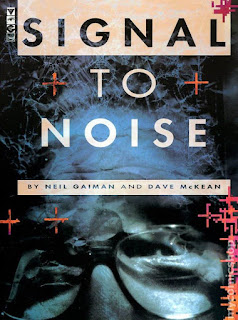Oh, and he also refuses to listen to his closest collaborator, who is also a woman.
Gaiman and McKean, at least their 1992 versions, would not I think characterize Signal to Noise that way. The Andy Wheeler who read it back in those days wouldn't have, either. But as someone who is now older than "the filmmaker" is, boy howdy is he the guy who can't get out of his own damn way. And I frankly can't see it as a coincidence that both of those voices of rationality are women: that's the role women are always stuck with, when dealing with pig-headed "visionary" men, having to try to cajole or entice some stupid bastard into doing the thing that is actually better for him, and feeling it's somehow their fault when they can't quite manage to do it.
You may notice I do not have much patience for this unnamed man-child. He is a self-indulgent prick. The movie he is attempting to make seems to be a boring plot-less slog, in which a large group of "common people" assembles in a hostile environment - expecting to all die - where they shuffle about for some extended period, and then do not die. Frankly, I think at least several of them likely would die, from exposure on a mountain-top, but I am not a visionary art-flick director.
I should explain the movie premise, I suppose. In AD 999, in a random village somewhere in Europe, everyone is sure "the millennium" means the world will end. There's no whisper of "Jesus returning" or the Kingdom of Heaven flowering forth on the Earth, just the doom of world-destruction. So they all wander up to the top of the local mountain to await midnight [1] and their inevitable deaths, during which time the camera presumably swoops around a lot to make some kind of visual interest out of a bunch of ragged peasants standing in the snow in the dark. Then, when they don't die, they go back to the village: The End!
This movie would be a tedious mess; we don't see any aspect of it that shows characters or relationships, so we tend to assume all of these characters would be broad, generic types for maximum axe-grinding. And it is a movie entirely about something that does not happen.
I also wonder if 2022 Gaiman and McKean would see this filmmaker differently; they're both substantially north of his fifty these days, and have each spent the last two decades (roughly) in filmed entertainment, so their opinion of their earlier depiction of a world they now live in may not be entirely laudatory.
I should clarify: within the context of Signal to Noise, the reader is meant to believe that this unmade movie, which I am sorry to tell you has the incredibly pompous title Apocatastasis, would be brilliant and wonderful. This is the point of the book: that Unnamed Genius needed to be dying to make it, virtually, in his head, and then write a script that just maybe will be turned into that perfect movie after he snuffs it.
But wait...notice the palmed card there? Turned by whom? The film theory embedded here is pure auteur: a film is made by One Towering Talent, One Man With a Vision, not all of the little people who get in the way and sully his vision. The equivalent of those "common people" milling about in the movie itself, with no clear idea of what to do, just a crazy thought of apocalypse. And the auteur is gone by the end of the book; only his script remains.
Signal to Noise is ambitious and gorgeous and full of ideas. I've always had it in my head as the least-successful of the Gaiman/McKean collaborations, and my impression is that the rest of the world feels that way as well. It's a book that aims higher than it hits, at least for readers who can't fully invest in the myth of the Self-Martyred Creator. I found central aspects of it deeply annoying; readers similar to me will likely feel the same.
[1] I am not an expert on medieval timekeeping, but there's a prominent Signal From Fred moment here where the narrative points out that clock faces did not even exist until several hundred years later. I suspect the entire idea of "a moment in time" as something that could be defined was alien to this society: they lived in days and the eight liturgical divisions of the day (Prime, Terce, etc.), but that's about it. "Midnight" was not a thing. The moment of "New Year's Eve" as the modern world knows it even less so.
On top of that, I'm pretty sure days began at dawn for medieval Christians, and at sunset for their Jewish neighbors. And that's a pity, because the sun breaking out on the horizon would actually be a lovely visual metaphor for non-apocalypse if Gaiman & McKean had thought of it.

No comments:
Post a Comment